Looking for the best AI website builder in 2025? Here's a quick guide to help you choose the right platform for your needs. AI tools have made creating websites faster, cheaper, and easier than ever - no coding required. Whether you're building a portfolio, an online store, or a small business site, there's an AI-powered option for you…
Highlights:
Wix ADI: Best for beginners with hybrid customization tools. Starts at $14.50/month.
Hostinger AI Builder: Budget-friendly ($2.69/month) but limited customization.
Shopify AI Commerce: Tailored for e-commerce with advanced inventory features.
Squarespace Blueprint AI: Focuses on polished designs for portfolios.
10Web AI Assistant: WordPress-centric with advanced hosting options.
Quick Comparison Table:
Platform | Best For | Starting Price | Key Features |
|---|---|---|---|
Wix ADI | Beginners | $14.50/month | AI-generated templates, drag-and-drop |
Hostinger AI Builder | Budget users | $2.69/month | AI copywriting, logo generator |
Shopify AI Commerce | E-commerce | $29/month | Smart product recommendations, automation |
Squarespace Blueprint | Creative professionals | $23/month | Editorial-quality layouts, image tools |
10Web AI Assistant | Agencies, WordPress users | $85/month | AI migration, hosting, content tools |
These platforms cater to different needs, balancing automation with customization. Dive into the full article for detailed reviews and pro tips for each builder.
Best Website Builders in 2025 - Comprehensive Comparison
1. Muse Platform
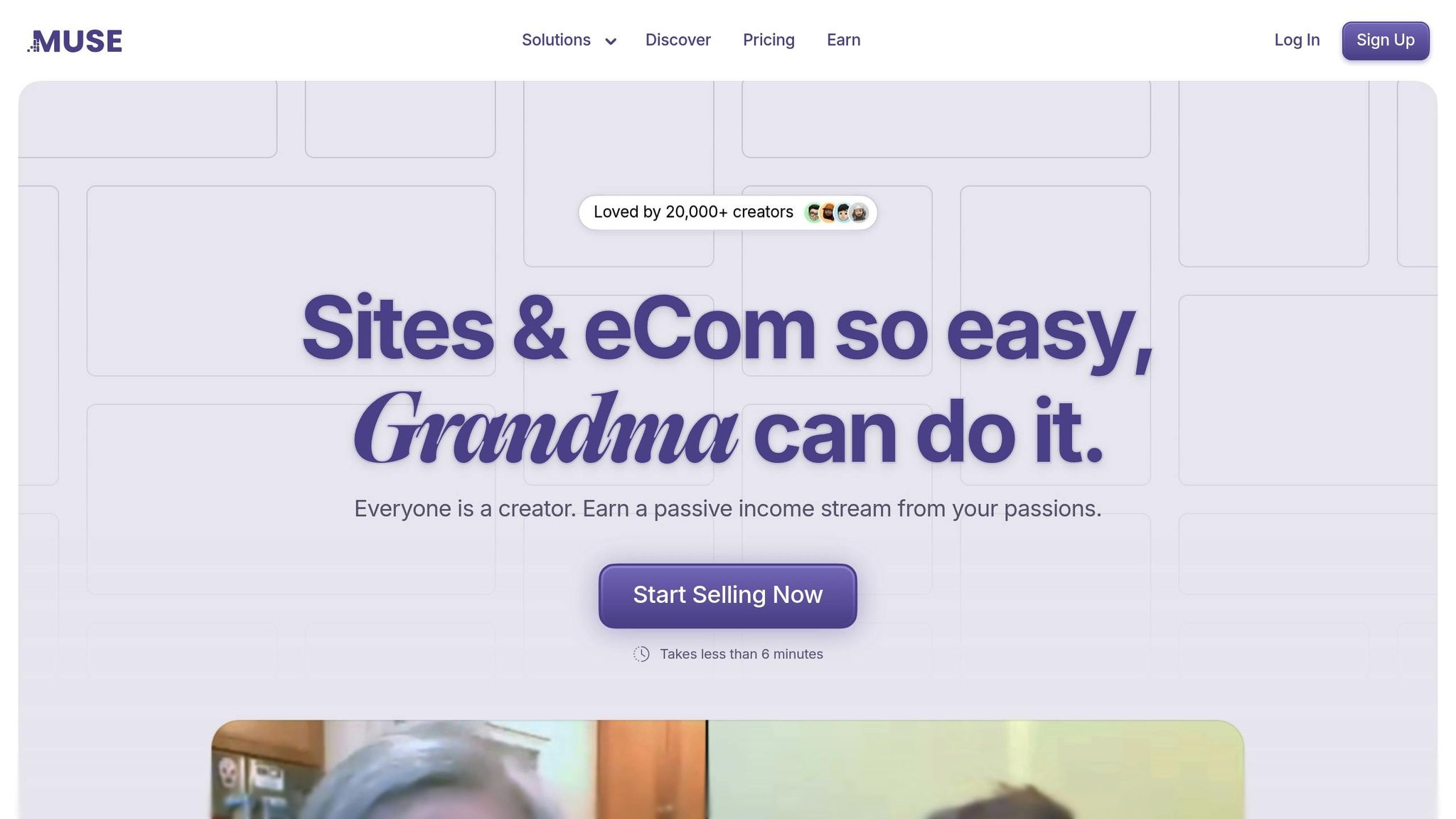
Muse Platform focuses on AI-driven solutions for digital commerce, setting itself apart from tools designed for service-based businesses. It simplifies website creation for digital entrepreneurs by using AI to optimize layouts and manage complex e-commerce tasks. This aligns perfectly with the theme of blending automation with practical business needs.
Users can either build pages block-by-block or let Muse's AI generate entire layouts. Unlike Hostinger, which leans toward physical goods, or Shopify with its inventory-heavy model, Muse specializes in digital products.
Feature Category | Capabilities |
|---|---|
AI Generation | Layout optimization, sales copy creation, block suggestions |
E-commerce | Digital downloads, courses, coaching, physical products |
Storage | 1GB (Free) to 100GB (Pro) |
Transaction Fees | 9% (Free) to 1% (Pro) |
One of Muse's most notable features is its support for a wide range of digital products, with native integration for 23 different types - far surpassing competitors like Hostinger, which supports only seven [1][3].
"The AI optimized their product grid layout based on screen size analytics, resulting in a 40% mobile conversion rate increase", according to a 2024 case study of VectorVault, a digital art marketplace using Muse [6].
However, Muse isn't without its drawbacks. Its template library offers just 48 themes, which pales in comparison to Wix's 900+ options [3]. Additionally, its SEO tools are fairly basic, missing advanced features like schema markup control that more established platforms provide [3].
Muse stands out for its quick setup, allowing users to create a website in just 11 minutes using simple, plain-language prompts. This strikes a balance between efficiency and maintaining brand uniqueness, similar to what Wix ADI offers.
2. Wix ADI
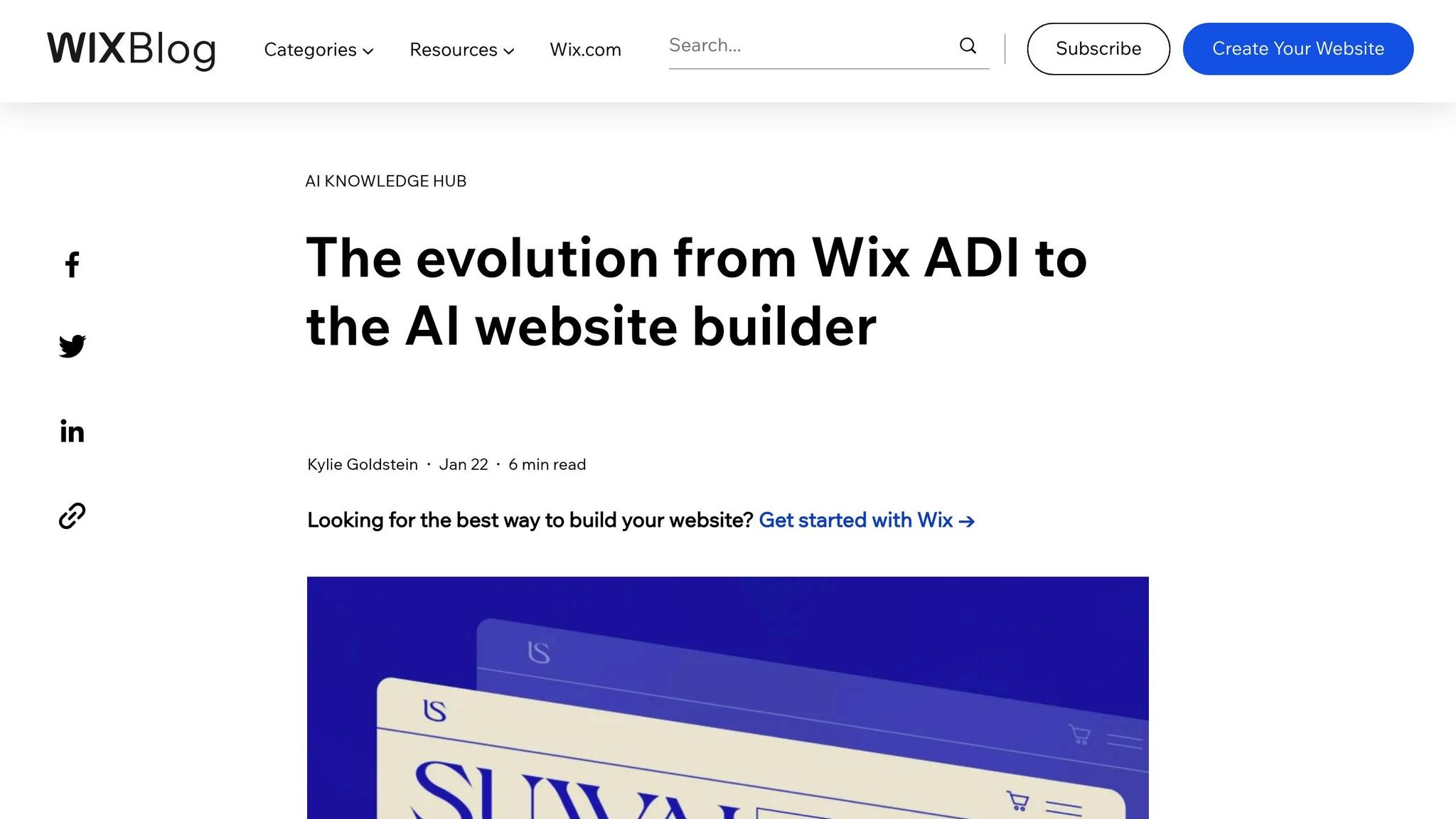
Wix ADI (Artificial Design Intelligence) combines smart automation with flexible customization, making it a standout in AI-driven website building. It's known for delivering both speed and polished results.
The setup is simple. Users fill out a detailed questionnaire about their brand and business goals. Based on this, the AI creates several tailored template options. According to internal data, Wix ADI can produce websites 50% faster than traditional methods [7].
Here are some of its standout features:
AI Text Creator: Helps generate relevant content, great for overcoming writer's block.
Section Generator: Automatically designs dynamic layouts.
Wix Ascend: Manages marketing tasks like automation.
Style Matching: Ensures your site stays consistent with your brand identity.
Premium plans start at $14.50/month [3], which includes hosting, custom domains, and advanced e-commerce features. While the pricing is higher than some alternatives, the platform's extensive tools make it a strong choice for businesses aiming for professional-quality websites.
"The best AI website builder overall" - Tech.co's testing team [1]
Wix ADI stands out for non-technical users thanks to its hybrid customization approach. You can fine-tune every detail using the drag-and-drop editor while still benefiting from AI-generated suggestions [1][3]. In user tests, the platform achieved an impressive 92% satisfaction rate [3].
Pro tip: Use the "Regenerate Site" feature to create multiple layout versions, then tweak them manually for the perfect look.
3. Hostinger AI Builder
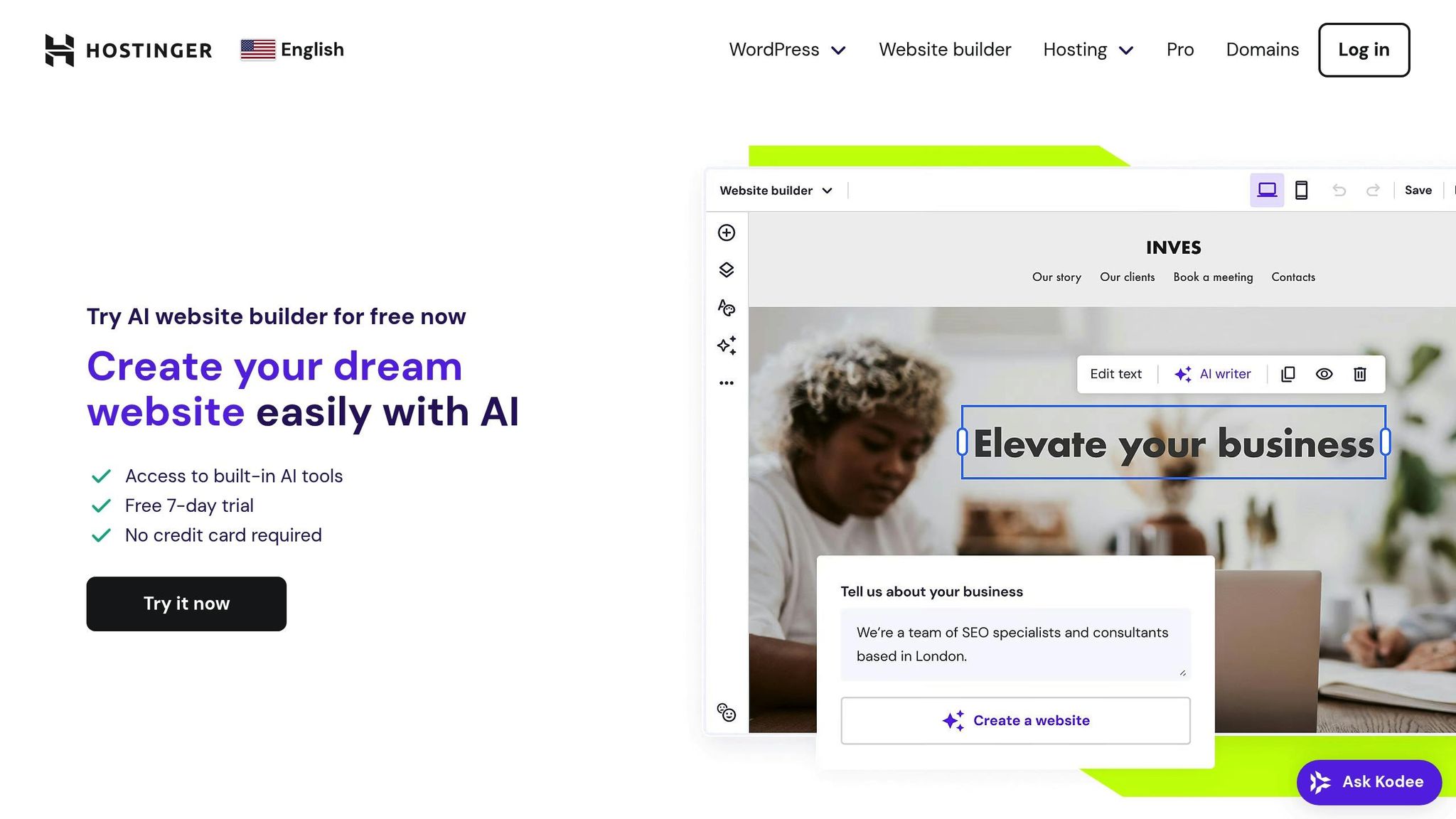
Hostinger AI Builder is designed with budget-conscious users in mind, offering a straightforward and hassle-free experience. Its simple 3-step process boasts an impressive 92% success rate for first-time users [3].
During testing, it outperformed competitors by generating logos and product descriptions 70% faster, with product copy achieving an 8/10 readability score (compared to the industry average of 6.5) [1][3].
Here’s what the platform’s AI tools bring to the table:
Logo generator with SVG format options
Automatic color scheme matching for cohesive designs
AI-powered copywriting for product descriptions and more
Background removal for product images
Pricing starts at just $2.69/month [3], making it the most affordable option on this list.
"Cheap, lightweight solution ideal for startups" - Tech.co [1]
That said, simplicity has its trade-offs. Unlike Wix’s versatile editor, Hostinger provides only 12 pre-designed layouts tailored to specific industries [1]. Customization after the initial site generation is limited, and there’s no drag-and-drop editor available [3].
For e-commerce users, the platform can efficiently manage stores with up to $12,000 in monthly sales but struggles with inventories exceeding 500 products [3]. It does, however, include helpful tools like upselling suggestions and sales forecasting.
Support is another strong point, with 24/7 live chat and an average response time of just 2 minutes and 13 seconds [1].
Pro tip: Prepare a list of brand-specific keywords before starting. Users who select the informal tone setting report 35% higher engagement [3].
When it comes to blog posts, error rates are low - just 3 errors per 1,000 words [3]. SEO meta tag generation is also reliable, achieving 85% keyword accuracy [3].
4. Shopify AI Commerce

Shopify AI Commerce is tailored for businesses focused entirely on e-commerce, offering tools that go far beyond just building a website. Recent tests revealed that stores using Shopify's AI features saw a 20-35% boost in conversion rates thanks to smart product recommendations [3].
Here’s what Shopify's AI can do:
Inventory Management: Predictive alerts for restocking and sales forecasting
Content Automation: Generates product descriptions and marketing copy
Customer Insights: Recognizes purchase patterns for targeted campaigns
Dynamic Pricing: Suggests prices based on market trends
What makes Shopify stand out is its focus on e-commerce. Its AI tools are specifically designed to simplify online selling. For example, the automated inventory system handles even large product catalogs while offering upselling suggestions.
Shopify also supports a wide range of third-party AI integrations through its app marketplace, letting merchants add specialized features to their stores.
"Unmatched inventory automation, though with a steeper learning curve than competitors" - Tech.co [1]
But there are trade-offs. While Shopify offers more advanced automation than platforms like Wix or Hostinger, it comes with a higher price tag - 2-3x more expensive than basic site builders [2][4]. It’s also less flexible for businesses needing highly customized branding [1][3].
How Shopify's AI Works
The AI setup involves two main steps:
Business Analysis: The system evaluates your products and market trends.
Automated Setup: It creates store layouts, content, and pricing strategies.
One standout feature is the abandoned cart recovery system. Using AI, it analyzes customer behavior and sends personalized follow-ups [3]. Shopify also employs natural language processing to help with SEO, though some users say the initial content may need tweaking [1].
For inventory management, Shopify’s AI handles tasks like tax calculations and shipping optimization [3]. This makes it a great option for businesses looking to scale with advanced automation.
Pro Tip: Always review AI-generated content for niche products to ensure accuracy [3].
5. Jimdo Dolphin
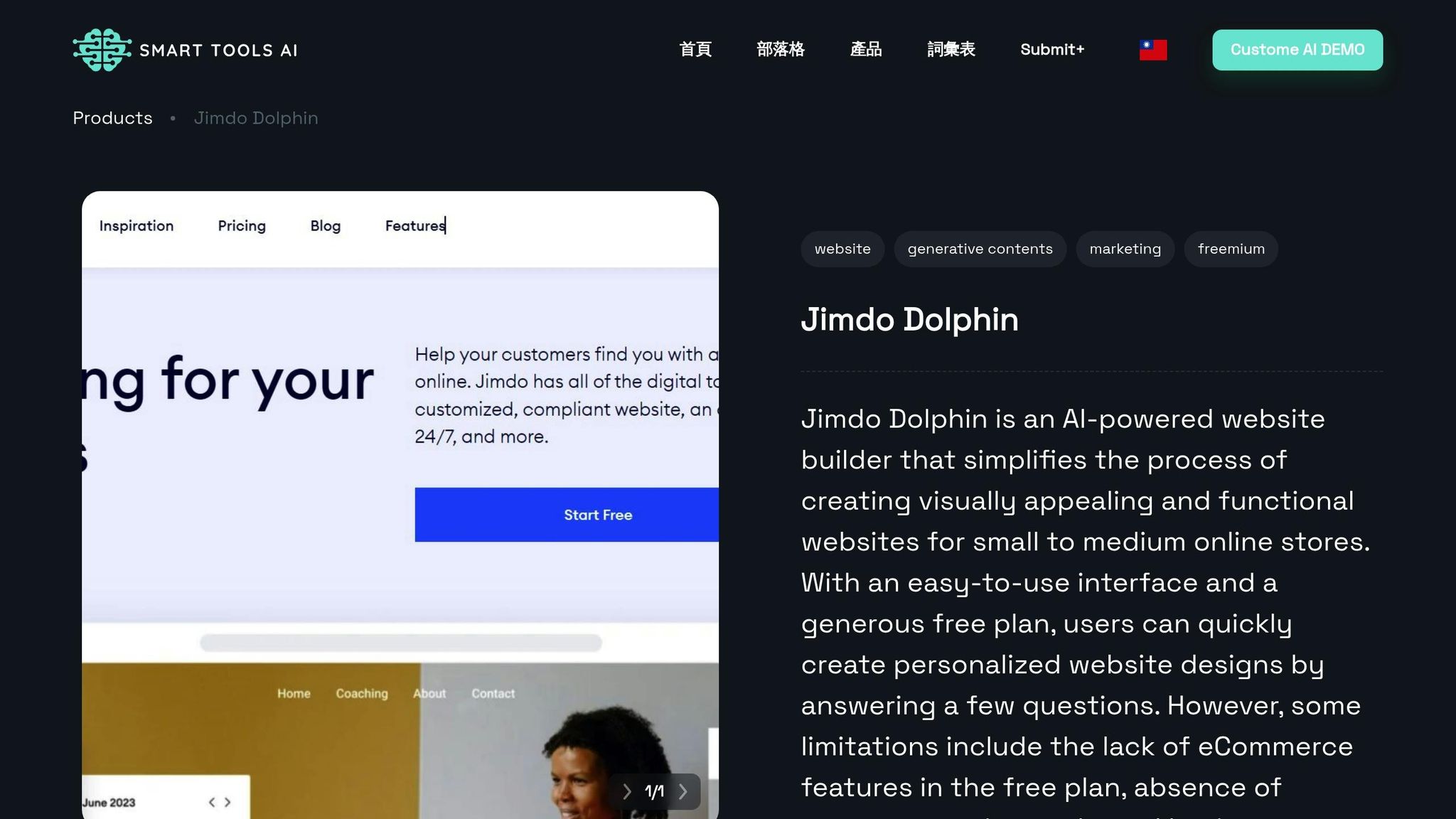
Jimdo Dolphin is designed to make website creation simple for small businesses. Unlike Shopify, which handles more complex e-commerce needs, Jimdo Dolphin focuses on ease of use with a quick 5-step setup. Its AI engine customizes layouts based on your business type, automatically adding features like appointment booking or product galleries. One of its key strengths is its focus on European compliance, including automated GDPR-compliant cookie banners and legal page generators [1][3].
Feature | Basic Plan ($9/mo) | Business Plan ($15/mo) |
|---|---|---|
AI Layout Generation | ✓ | ✓ |
Legal Text Generator | ✓ | ✓ |
SEO Wizard | Limited | Advanced |
Storage | 5GB | 15GB |
Google Business Integration | ✕ | ✓ |
Jimdo Dolphin also includes a Smart Assistant that lets you rewrite content using simple language commands like "make this paragraph more professional" [3]. According to users, sites built with Jimdo Dolphin see 43% lower bounce rates compared to manually created websites [1].
That said, the platform's simplicity has its limits. The AI-generated templates come with only three preset fonts, and you can’t tweak mobile layouts after they’re created - something competitors like Wix and 10Web allow [1]. These limitations highlight the balance between AI-powered efficiency and user control.
Jimdo Dolphin also offers an integrated SEO wizard, providing localized keyword suggestions and one-click integration with Google Business Profiles [1][3].
Pro Tip: Enter detailed business information during the setup process to get more accurate AI-generated content [3].
6. 10Web AI Assistant
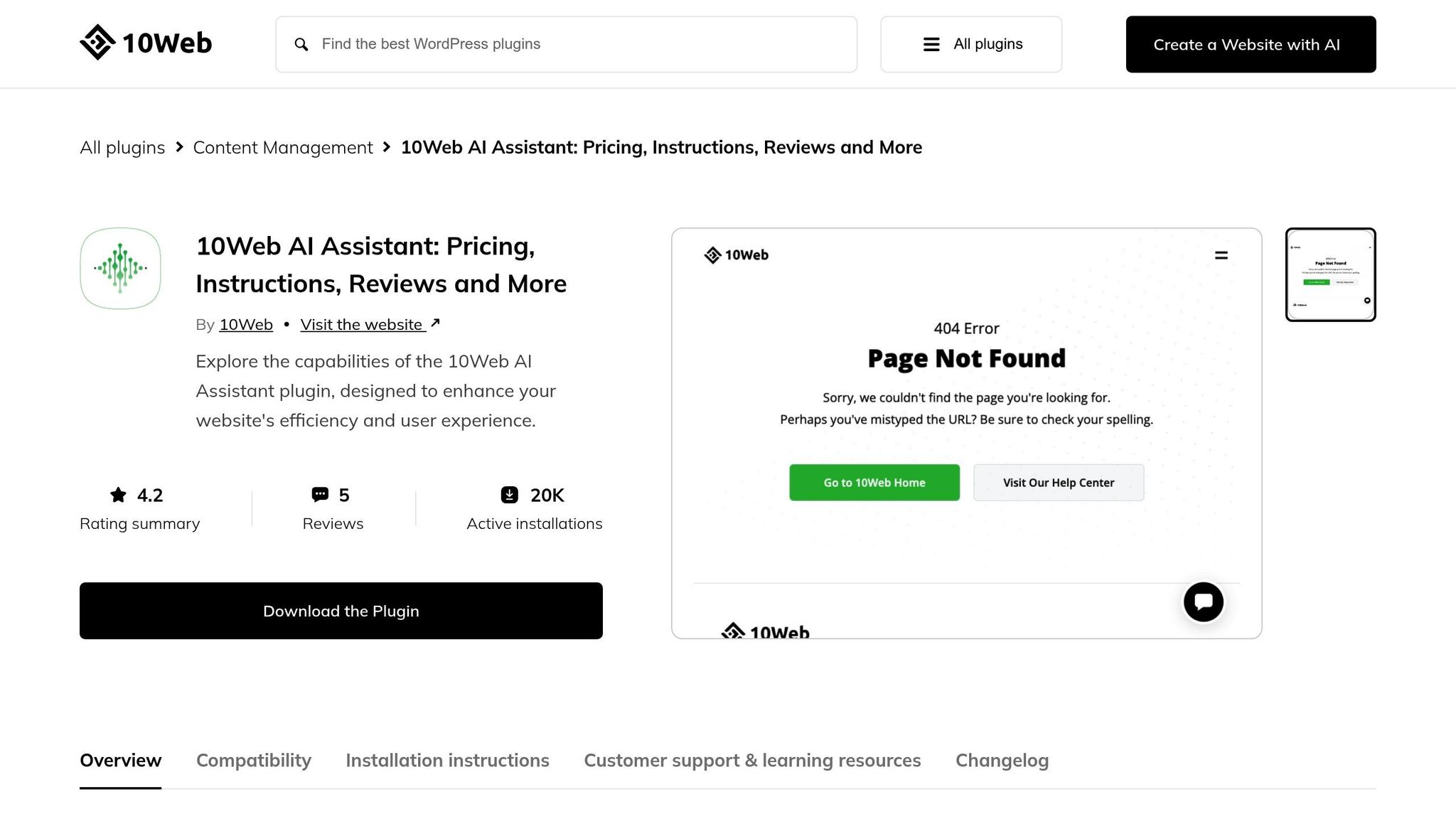
10Web AI Assistant is a WordPress-focused website builder that combines AI tools with a solid hosting setup. Its AI features cover tasks like content creation and technical optimization, making it a great option for agencies juggling automation and client-specific needs.
This platform is a good example of how AI tools can target specific user groups while maintaining essential features. It offers three main AI tools: an AI site builder for creating websites from prompts, AI Web Conversion for improving existing sites, and an AI Migration Service for smooth WordPress transfers [1]. Users can adjust the content tone - formal or informal - to fit their brand’s voice [1].
"The platform's ability to maintain consistent header/footer elements across client sites gives it a significant advantage over fragmented solutions", according to Tech.co's recent analysis [1].
10Web includes hosting on high-performance servers [5] and provides over 60 professional templates [2]. It supports all major WordPress plugins, including WooCommerce and Elementor [2], making it suitable for both blogs and online stores.
For digital marketing agencies, the ability to switch between formal tones for B2B clients and informal styles for lifestyle brands is a key benefit [1]. The centralized dashboard simplifies managing multiple client websites while ensuring consistent branding [5].
Although it requires more technical knowledge than platforms like Framer or Squarespace [3][5], 10Web’s strong WordPress integration makes it an ideal choice for those already familiar with WordPress and looking to streamline their workflow with AI tools.
7. Framer AI
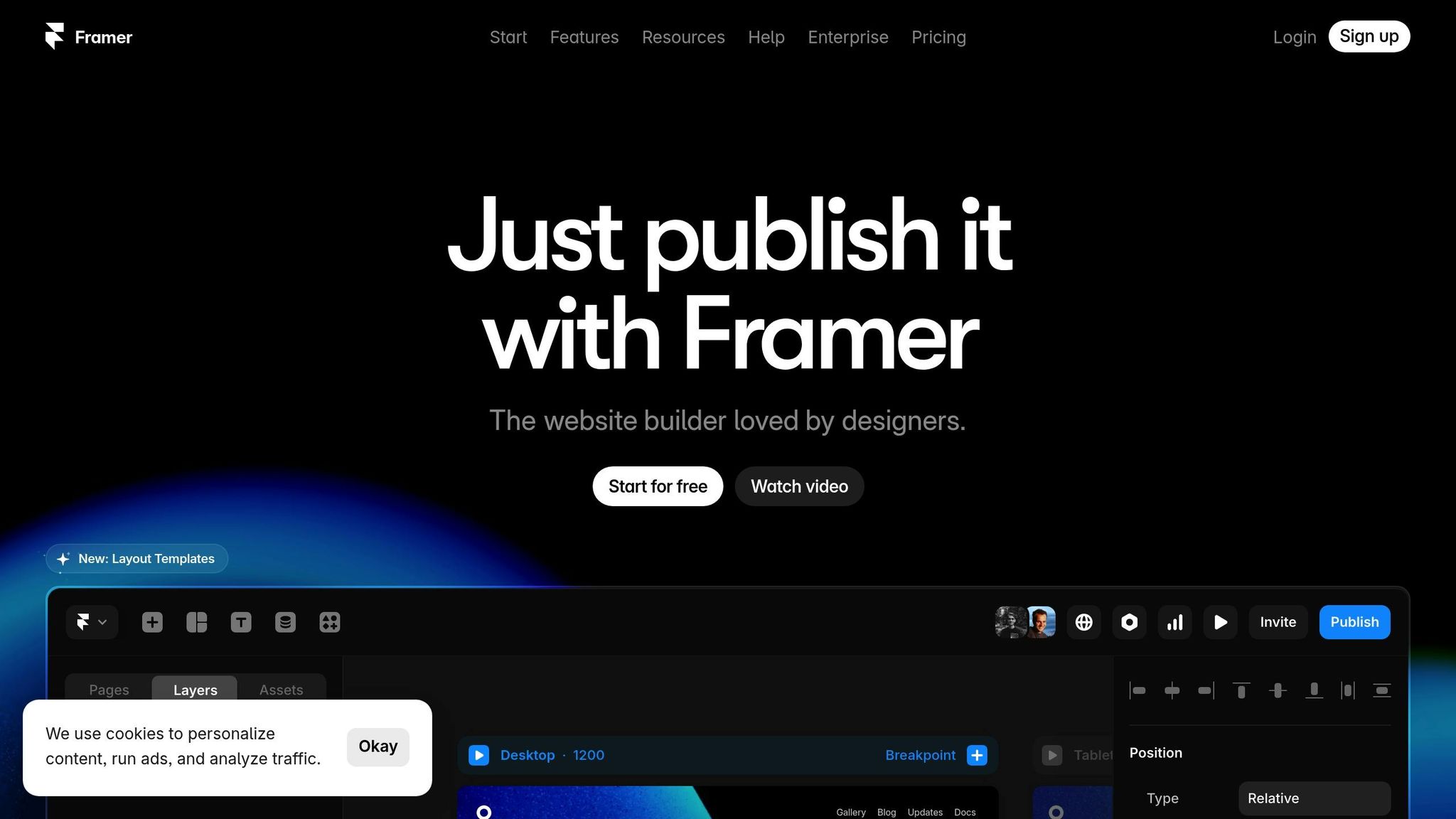
If 10Web's WordPress-centric approach feels too complex, Framer AI steps in with a user-friendly way to create websites quickly. It strikes a balance between automation and giving users control over their designs.
Framer AI builds entire layouts from simple business descriptions. Its visual editor lets you tweak fonts and colors without messing up the overall design [1].
"The platform's focus on visual design rather than complex functionality makes it ideal for creative professionals who prioritize aesthetics", says Tech.co in a recent review [1].
For designers, Framer AI integrates seamlessly with popular tools like Figma and Sketch [1]. It also offers a library of pre-made components and templates, while giving advanced users the option to add custom code - all while keeping its AI-driven core intact [6].
Plan | Price |
|---|---|
Basic | Free |
Pro | $20/month |
Enterprise | Custom |
Although it doesn’t specialize in eCommerce like Shopify, Framer's visual design tools work well alongside its AI features. With a 4.5/5 rating on G2 [10], users praise its ease of use and design strengths. However, its eCommerce options are limited compared to platforms designed specifically for online stores [1].
The drag-and-drop interface, paired with AI-powered design suggestions [1], allows for plenty of customization while keeping things efficient. Plus, it automatically generates layouts optimized for mobile devices [1].
8. Squarespace Blueprint AI
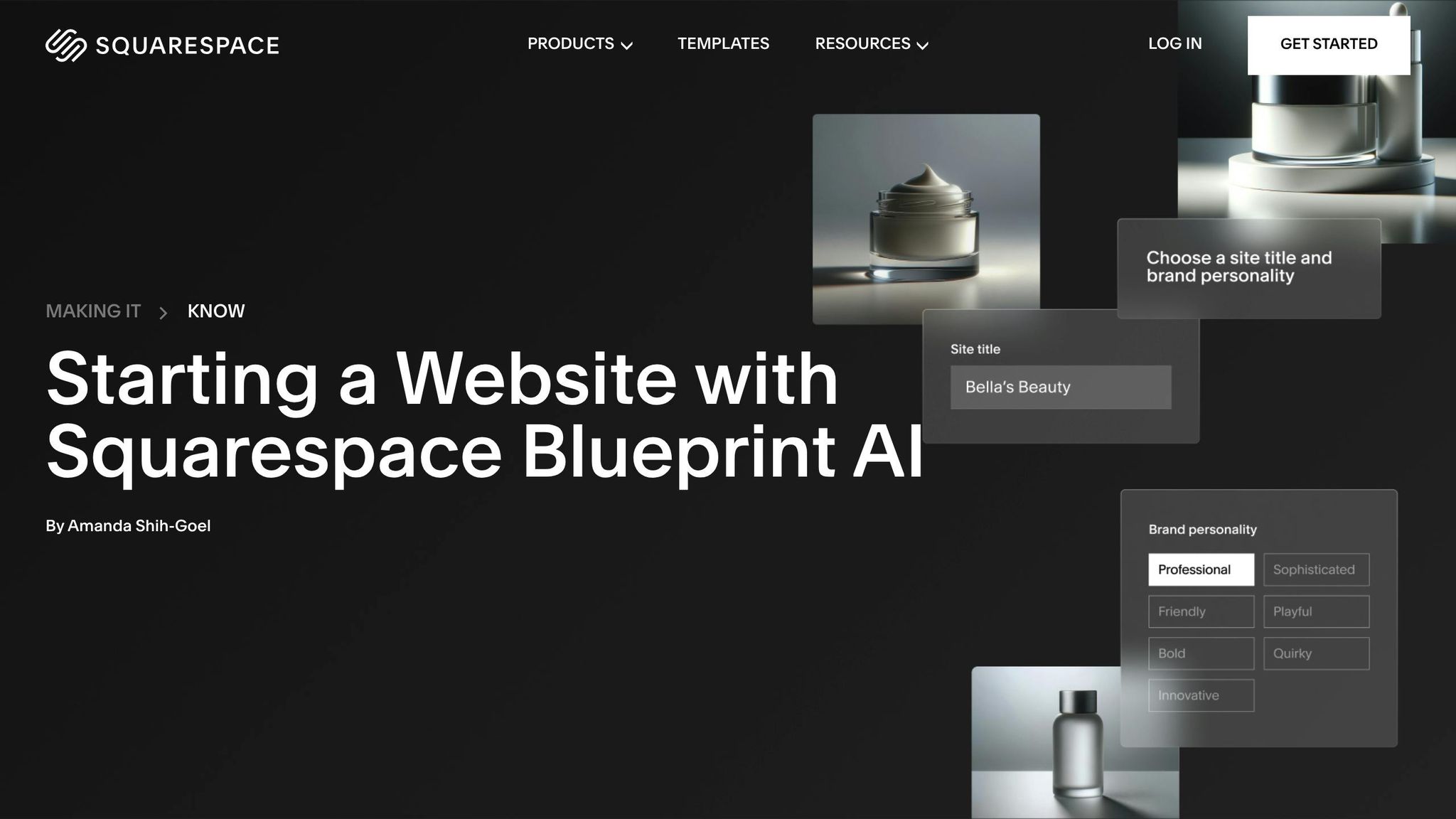
Squarespace Blueprint AI shifts the focus from WordPress-style tools to a more visual design approach. It uses machine learning to create custom site designs, analyzing millions of websites to combine automation with a brand-focused aesthetic [2][6].
One standout feature is Design Lock, which automatically adjusts spacing and typography when new elements are added, keeping the site's appearance consistent and polished [3]. Even with minimal technical skills, users can achieve results that rival manually designed sites.
"Blueprint AI produces editorial-quality layouts for creative portfolios 40% faster than manual methods", according to Tech.co's 2025 review [1].
The platform also includes smart image optimization to ensure galleries look cohesive, while the adaptive layout system reduces the need for manual tweaks by 35% compared to competitors like Hostinger [11].
Plan Type | Monthly Price (Annual Billing) |
|---|---|
Business | $23 |
Commerce | $27 |
This pricing places Squarespace between Hostinger's budget-friendly options and Shopify's higher-end e-commerce plans. Unlike Wix, which leans on conversational AI for interactive editing, Squarespace focuses on automating design elements [1].
Blueprint AI excels in creating portfolio-ready layouts, complete with AI-generated copy suggestions tailored to creative professionals [1][3]. Users often highlight its simplicity and fast setup, though some mention that the AI-generated designs can occasionally feel repetitive [4].
9. Durable.co
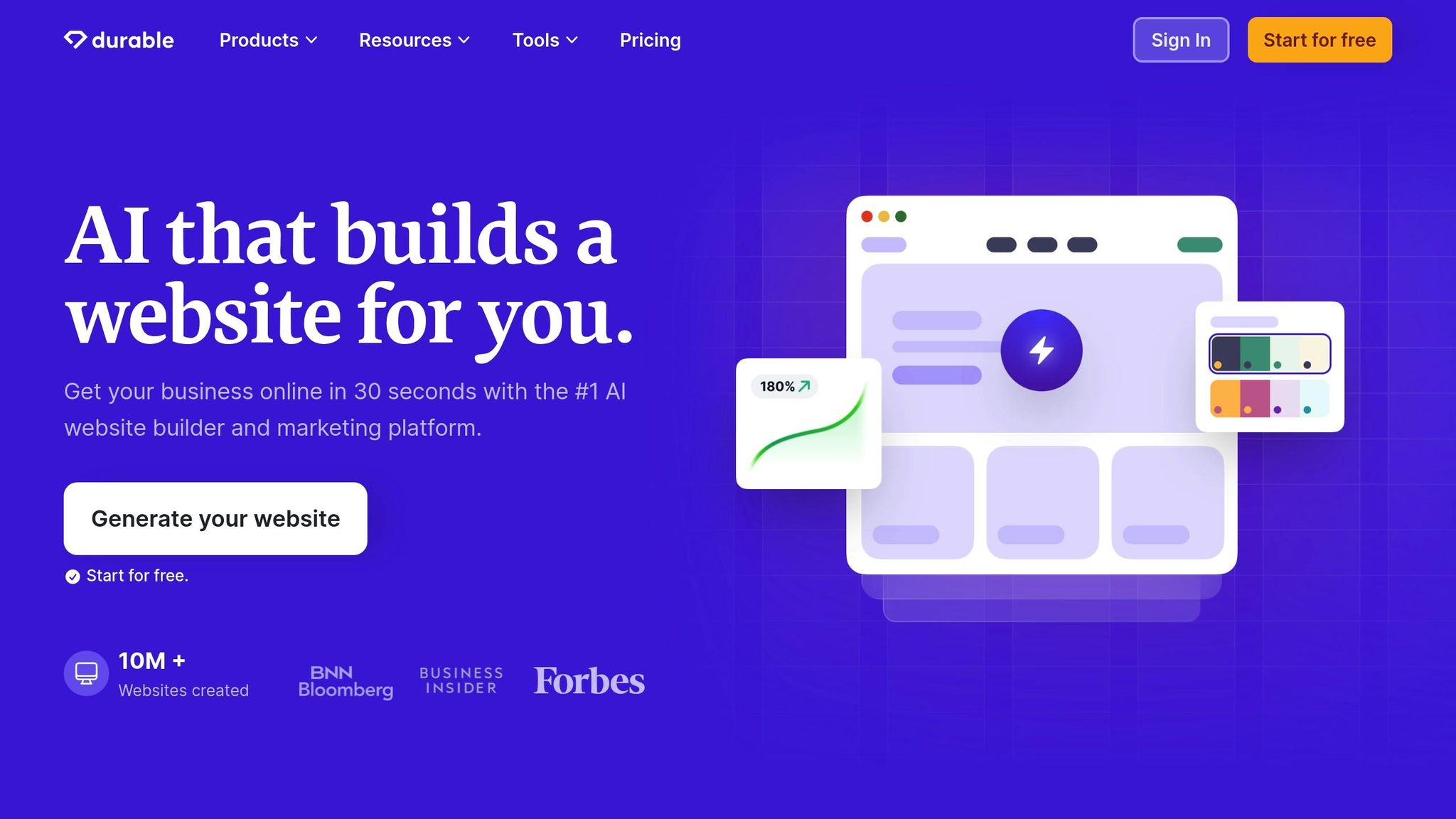
Durable.co is designed for service businesses that need practical tools alongside website creation. Unlike Squarespace, which emphasizes visual design, Durable.co focuses on features like appointment booking systems, client portals, online scheduling, invoicing, and CRM tools - all powered by AI [4][2].
The platform's AI engine simplifies setup by creating industry-specific content and service-focused visuals, such as team photos and service galleries. While it doesn't offer much design flexibility, it prioritizes essential business tools.
Plan | Price | Features |
|---|---|---|
Starter | $0 | Basic website builder, AI content generation |
Growth | $15 | Scheduling, CRM basics |
Business | $55 | Advanced CRM, invoicing, priority support |
Durable.co boasts a 4.8/5 rating on Trustpilot, with over 500 reviews from service business owners [9]. Paid plans include a 14-day trial [4].
It integrates seamlessly with tools like Google Analytics, Mailchimp, and Zapier [2].
"Durable.co produces professional-quality business websites in minutes rather than days. The AI-generated content is remarkably accurate for specific industries", says a verified Trustpilot review [9].
While it offers a robust set of business features, some users point out that its design customization is limited compared to platforms like Squarespace Blueprint [9]. However, this seems to be a deliberate choice, focusing on functionality over aesthetics.
If you're a service professional looking for a fast, professional website without needing technical expertise, Durable.co is a great option. Its AI-driven tools cater to practical business needs, making it a strong alternative to creative platforms like Framer AI.
10. Bookmark AIDA
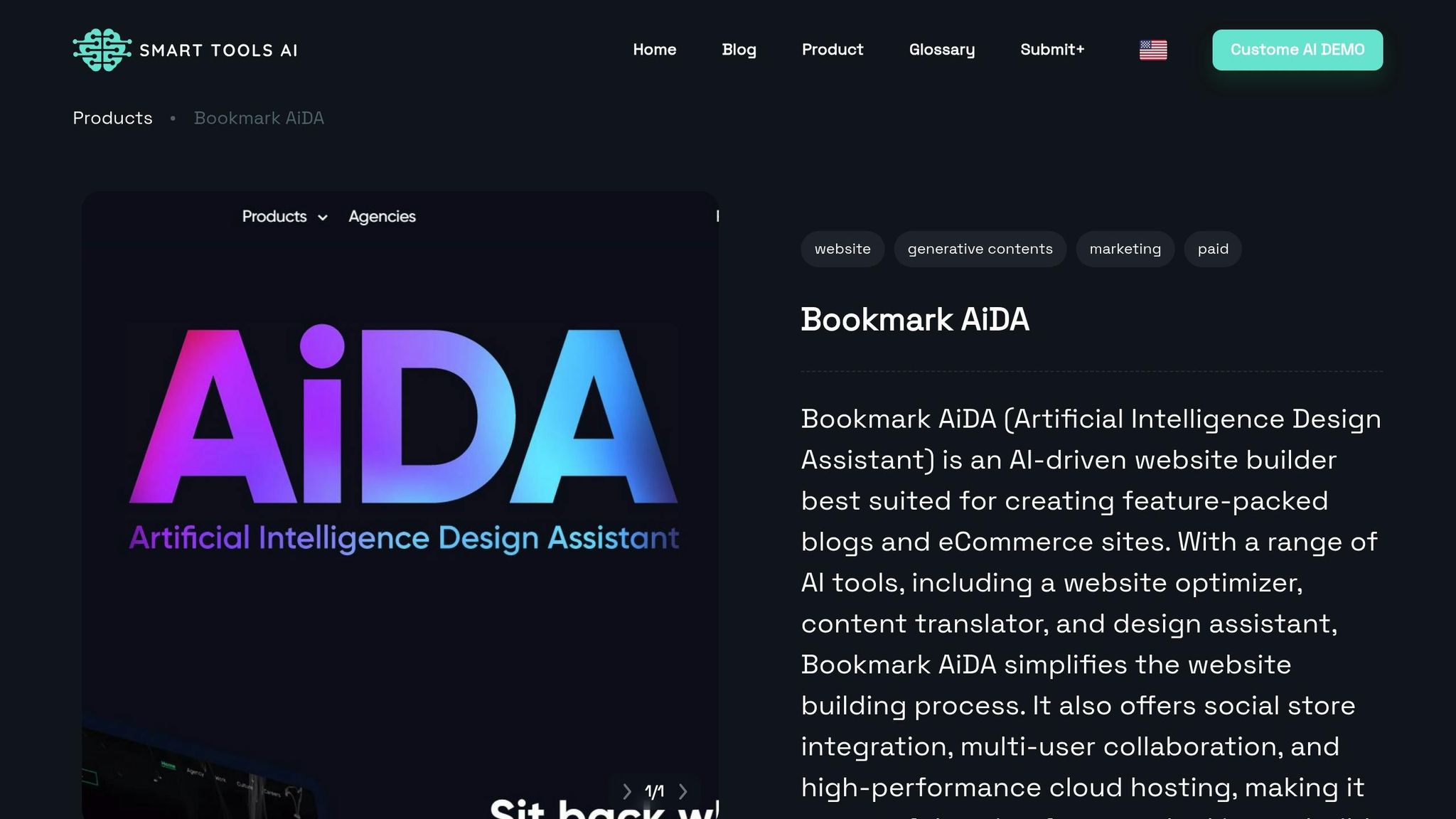
For business owners focusing on mobile engagement, Bookmark AIDA offers a mix of automated website creation and customization options. Using AI, the platform analyzes business details to craft tailored websites.
Feature | AI Benefits |
|---|---|
AI Capabilities | Automated design generation, responsive layouts, SEO tools |
E-commerce | Built-in store features, product management |
Security | Free SSL certificates |
Storage | 5GB - 50GB |
AIDA's pricing lands between Hostinger's budget-friendly plans and 10Web's higher-end options. It ranges from a free tier to $25/month for the Business plan when billed annually [4].
What sets AIDA apart is its mobile-first design approach. It focuses on creating mobile layouts with 90% fewer manual adjustments than the industry average [3]. This aligns with Cybernews' prediction that 61% of website traffic in 2025 will come from smartphones [3].
"The AI-powered design capabilities have significantly reduced the time needed to create professional-looking websites", says a verified Trustpilot review [7].
However, AIDA does have some drawbacks. Its design flexibility is more limited compared to traditional platforms like Wix or Squarespace [7]. While the drag-and-drop editor allows some customization, it doesn’t offer the same level of creative freedom. This makes it a better choice for users who prioritize efficiency over full creative control.
Much like Muse simplifies digital sales, AIDA focuses on essential features while keeping things straightforward. With built-in SEO tools and e-commerce functionality, it provides practical solutions without overwhelming users.
Features and Pricing Comparison
When comparing these platforms, three main differences stand out:
Target Audience: Each platform caters to specific markets. Muse is ideal for selling digital products like courses, downloads, and coaching. Shopify, on the other hand, focuses on automating physical retail operations. Durable.co zeroes in on service-based businesses, showcasing how AI tools are now tailored to specific industries [1][3].
Level of Customization: The platforms vary in how much control they give users. Wix ADI and Squarespace allow detailed editing after the initial setup [1][5]. Meanwhile, Hostinger and Muse emphasize ready-to-use templates for quicker setup [3][8]. This shows how each platform balances automation with user flexibility.
AI Features: The use of AI differs across platforms. 10Web focuses on tools for website migration and adjusting content tone [1]. Squarespace Blueprint AI leans heavily on automating design [5]. Framer AI combines both, offering advanced visual editing features [1][6].
Pricing starts at $2.69/month with Hostinger for basic features and goes up to $85/month with 10Web for agency-level tools [1][3]. These prices reflect the depth of features and the level of AI integration offered by each platform.
This breakdown shows how website builders are evolving to meet specific user needs while keeping AI-driven efficiencies at their core.
Final Thoughts
The 10 builders reviewed showcase how AI is reshaping business operations, from Muse's focus on digital products to Shopify's approach to inventory automation. Development times have shrunk from weeks to mere minutes, while costs have plummeted compared to older methods [1][3][5].
Despite these advancements, there are still three main challenges. Analysts forecast key updates by 2026:
Context-aware design systems powered by computer vision, projected to be adopted by 67% of builders
Real-time AI-powered collaborative editing tools
Testing shows that only 60% of AI-generated content is ready to use without human edits [1]. This underscores why our evaluation emphasizes platforms that strike the right balance between automation and user control.
For businesses considering these platforms, it's crucial to weigh current functionality against future possibilities. Cybernews predicts that by 2026, 70% of website builders will feature GPT-4 level content generation [3], pointing to an increasingly automated web development landscape.
"The ethical use of AI in website creation, including data privacy and transparency in AI-generated content, is becoming an important consideration for businesses and developers" [6]
With the global AI web development market projected to hit $2.5 billion by 2025 [6], these tools not only address current needs but also set the stage for what's to come.
FAQs
What is the easiest AI website builder?
After thorough testing and user feedback, Wix ADI stands out as the easiest AI website builder to use [4]. By using brand-specific inputs, it generates polished designs effortlessly [1][3]. Plus, its interface integrates seamlessly with Wix's booking, eCommerce, and SEO tools [1]. This aligns with its hybrid approach, offering both automation and customization.
Which AI is best for making a website?
The "best" AI website builder depends on your goals and how much control you want. For eCommerce, Shopify AI Commerce is a top pick [3]. If you're looking for affordability, Hostinger offers plans starting at $2.69/month [3]. For digital creators, 10Web shines with its "AI Web Conversion" tools and high PageSpeed scores (90+) [1]. Meanwhile, Muse is ideal for selling digital products like courses and downloads, thanks to its specialized tools.
What is the best AI tool for website building?
Here’s a quick comparison of some leading options:
Platform | Best For | Starting Price |
|---|---|---|
Wix ADI | Beginners | $16/month |
Hostinger | Budget-friendly users | $2.69/month |
10Web | Agencies | $85/month |
Jimdo | Simple websites | Free tier available |
User reviews are consistently strong across these platforms, with Wix scoring 4.4/5 and Hostinger close behind at 4.3/5 in verified ratings.
Related posts
10 Tips for Mobile-Friendly Online Stores
How to Price Digital Products: A Guide for Beginners
Online Store Setup Checklist: 15 Steps to Launch
5 Best Ways to Sell Digital Downloads Online